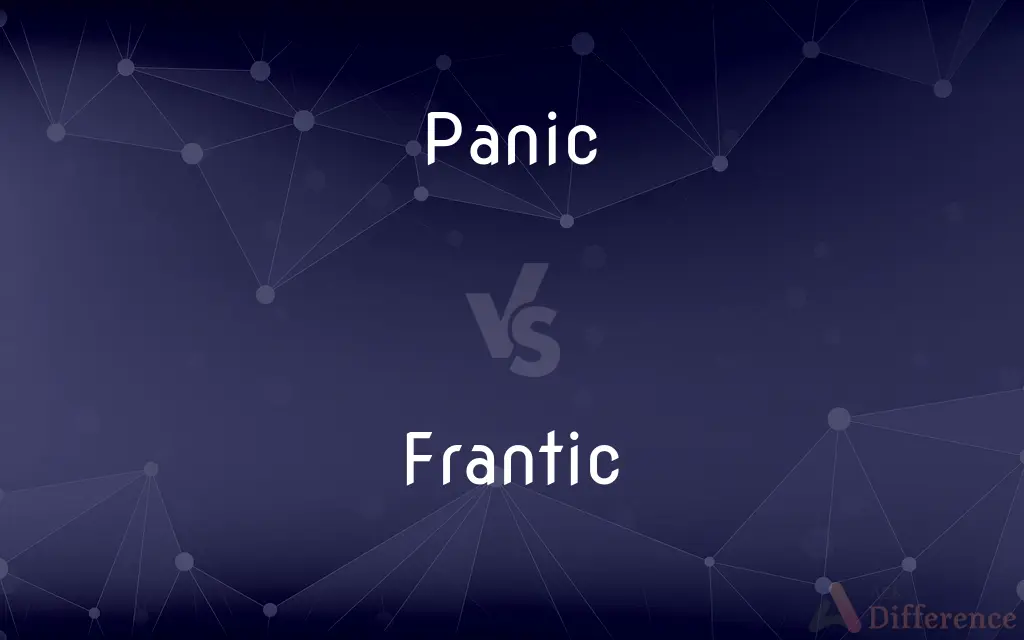Panic vs. Frantic — What's the Difference?
By Urooj Arif & Fiza Rafique — Updated on April 2, 2024
Panic involves sudden, overwhelming fear leading to unthinking behavior, while frantic describes a wildly hurried, desperate action or emotion.

Difference Between Panic and Frantic
Table of Contents
ADVERTISEMENT
Key Differences
Panic is a sudden, intense fear that can cause mass hysteria or irrational behavior, often without a clear cause. Frantic, on the other hand, refers to actions that are frenzied, hurried, and motivated by extreme emotion or desperation. While panic can lead to a freeze or flight response, being frantic is more about chaotic, rushed movements or efforts, often in response to a critical situation.
In the context of emotions, panic is characterized by the feeling of terror that paralyzes or causes chaos, whereas frantic emotions are driven by urgency or a need to accomplish something quickly. Panic may result in a lack of coherent action, while frantic behavior, although chaotic, is aimed at achieving a specific outcome.
When it comes to response to stimuli, panic can be seen as a broader, more paralyzing reaction to perceived danger, often leading to ineffective actions. In contrast, frantic actions, while also a response to stress or danger, are more focused attempts to solve a problem or avoid a negative outcome.
In a workplace scenario, an employee may panic when faced with an unexpected problem, potentially freezing up or making irrational decisions. Conversely, a frantic employee might rapidly search for a solution, moving quickly and possibly without a clear plan but with a clear goal in mind.
The physical manifestations of panic often include symptoms like sweating, trembling, and rapid heart rate, reflective of the body's acute stress response. Frantic behavior may share some of these physical signs but is more characterized by rapid, disorganized actions or movements as one attempts to address a crisis.
ADVERTISEMENT
Comparison Chart
Definition
Sudden, uncontrollable fear or anxiety
Wildly excited or urgent
Emotion
Fear, terror
Desperation, extreme worry
Behavior
May freeze, flee, or act irrationally
Hurried, disorganized actions
Stimuli
Perceived threat or emergency
Critical situation needing immediate action
Physical Signs
Sweating, trembling, rapid heart rate
Similar signs plus rapid, chaotic movements
Compare with Definitions
Panic
Overwhelming anxiety that causes wild unthinking behavior.
The crowd's panic during the fire caused a dangerous stampede.
Frantic
Desperate or wild with excitement, passion, fear, or pain.
She made a frantic effort to finish the report on time.
Panic
Sudden fear that provokes hasty actions.
She felt a sense of panic when she couldn't find her passport.
Frantic
Characterized by haste and confusion.
The emergency room was filled with frantic activity.
Panic
To cause sudden fear in.
The rumor about layoffs panicked the employees.
Frantic
Driven by urgency or desperation.
He searched frantically for the missing documents.
Panic
A state of widespread alarm.
News of the bank's failure sent a panic through the stock market.
Frantic
Reflecting extreme anxiety.
The frantic mother searched everywhere for her lost child.
Panic
To be overwhelmed with fear.
He panicked when he saw the approaching storm.
Frantic
Marked by fast and energetic, disordered, or anxiety-driven activity.
The team made frantic preparations for the big launch.
Panic
Panic is a sudden sensation of fear, which is so strong as to dominate or prevent reason and logical thinking, replacing it with overwhelming feelings of anxiety and frantic agitation consistent with an animalistic fight-or-flight reaction. Panic may occur singularly in individuals or manifest suddenly in large groups as mass panic (closely related to herd behavior).
Frantic
Highly excited with strong emotion or frustration; frenzied
Frantic with worry.
Panic
A sudden, overpowering feeling of fear, often affecting many people at once.
Frantic
Characterized by rapid and disordered or nervous activity
Made a frantic last-minute search for the lost key.
Panic
A state of extreme anxiety, such as that involved in a panic attack.
Frantic
(Archaic) Mentally deranged.
Panic
A state of frantic activity, usually accompanied by extreme concern or anxiety
The office was in a panic as the deadline approached.
Frantic
(archaic) Insane, mentally unstable.
Panic
A sudden widespread alarm concerning finances, often resulting in a rush to sell property to raise cash.
Frantic
In a state of panic, worry, frenzy or rush.
They returned the missing child to his frantic mother.
Panic
(Slang) A person or thing that is considered extremely funny.
Frantic
Extremely energetic
Frantic music
Panic
Of, relating to, or resulting from sudden, overwhelming terror
Panic flight.
Frantic
(archaic) A person who is insane or mentally unstable, madman.
Panic
Of or resulting from a financial panic
Panic selling of securities.
Frantic
Mad; raving; furious; violent; wild and disorderly; distracted.
Die, frantic wretch, for this accursed deed!
Torrents of frantic abuse.
Panic
Often Panic(Mythology) Of or relating to Pan.
Frantic
Excessively agitated; transported with rage or other violent emotion;
Frantic with anger and frustration
Frenetic screams followed the accident
A frenzied look in his eye
Panic
To affect or be affected with panic.
Frantic
Marked by uncontrolled excitement or emotion;
A crowd of delirious baseball fans
Something frantic in their gaiety
A mad whirl of pleasure
Panic
Alternative case form of Panic
Panic
(by extension (see the etymology))
Panic
Of fear, fright, etc: overwhelming or sudden.
Panic
Pertaining to or resulting from overwhelming fear or fright.
Panic
(uncountable) Overwhelming fear or fright, often affecting groups of people or animals; (countable) an instance of this; a fright, a scare.
Panic
; (by extension) any computer system crash.
Panic
A rapid reduction in asset prices due to broad efforts to raise cash in anticipation of such prices continuing to decline.
Panic
A highly amusing or entertaining performer, performance, or show; a riot, a scream.
Panic
(originally) Foxtail millet or Italian millet (Setaria italica), the second-most widely grown species of millet.
Panic
(by extension) A plant of the genus Panicum, or of similar plants of other genera (especially Echinochloa and Setaria) formerly included within Panicum; panicgrass or panic grass.
Panic
The edible grain obtained from one of the above plants.
Panic
(transitive)
Panic
To cause (someone) to feel fright]]; also, to frighten (someone) into acting hastily.
Panic
(computing) To cause (a computer system) to crash.
Panic
To highly amuse, entertain, or impress (an audience watching a performance or show).
Panic
(intransitive)
Panic
To feel panic, or overwhelming fear or fright; to freak out, to lose one's head.
Panic
(computing) Of a computer system: to crash.
Panic
A plant of the genus Panicum; panic grass; also, the edible grain of some species of panic grass.
Panic
A sudden, overpowering fright; esp., a sudden and groundless fright; terror inspired by a trifling cause or a misapprehension of danger; as, the troops were seized with a panic; they fled in a panic.
Panic
By extension: A sudden widespread fright or apprehension concerning financial affairs.
Panic
Extreme or sudden and causeless; unreasonable; - said of fear or fright; as, panic fear, terror, alarm.
Panic
An overwhelming feeling of fear and anxiety
Panic
Sudden mass fear and anxiety over anticipated events;
Panic in the stock market
A war scare
A bomb scare led them to evacuate the building
Panic
Be overcome by a sudden fear;
The students panicked when told that final exams were less than a week away
Panic
Cause sudden fear in or fill with sudden panic;
The mere thought of an isolation cell panicked the prisoners
Common Curiosities
Is being frantic a sign of anxiety?
Yes, frantic behavior can be a sign of anxiety, especially when it's a response to stress or perceived threats.
How can you manage frantic feelings?
Managing frantic feelings may involve taking a moment to pause, practicing deep breathing, prioritizing tasks, and focusing on one thing at a time.
What are the long-term effects of frequent panic?
Frequent panic can lead to panic disorder, a condition characterized by recurrent panic attacks and persistent concern about having more attacks.
How do you calm someone who is panicked?
Calming someone who is panicked involves speaking to them in a calm, reassuring tone, encouraging them to take slow, deep breaths, and helping them focus on grounding techniques.
What causes panic?
Panic is often triggered by sudden exposure to stress or perceived danger, causing an acute stress response in the body.
What does it mean to be frantic?
Being frantic means acting in a fast, disorganized, or desperate manner, often driven by anxiety, urgency, or desperation.
Can panic attacks be prevented?
While not all panic attacks can be prevented, stress management techniques, therapy, and medication can reduce their frequency and intensity.
What should you not do when someone is frantic?
When someone is frantic, avoid overwhelming them with questions or instructions; instead, offer calm support and help them focus.
Can exercise reduce feelings of panic or franticness?
Exercise can help reduce feelings of panic and franticness by releasing endorphins, improving mood, and reducing stress.
How does one differentiate between normal stress and panic?
Normal stress is typically a response to everyday challenges and pressures, while panic is a more intense, often irrational fear that can lead to physical symptoms and disruptive behavior.
Can children experience panic or act frantically?
Yes, children can experience panic and act frantically, often in response to fear, stress, or overwhelming situations.
Can mindfulness and meditation help with panic and franticness?
Yes, mindfulness and meditation can help manage panic and frantic feelings by promoting relaxation, improving self-awareness, and reducing stress.
Are panic and anxiety the same?
While panic and anxiety are related, panic is usually more intense and sudden, often manifesting as a panic attack, whereas anxiety can be a persistent, generalized feeling of worry.
Do panic and frantic behaviors always indicate a disorder?
Not always; while they can be symptoms of anxiety-related disorders, panic and frantic behaviors can also occur in response to specific stressors or emergencies.
Is it possible to live a normal life with panic disorder?
Yes, with appropriate treatment, including therapy and medication, individuals with panic disorder can lead normal, productive lives.
Share Your Discovery

Previous Comparison
Crime vs. Delict
Next Comparison
Vivid vs. LividAuthor Spotlight
Written by
Urooj ArifUrooj is a skilled content writer at Ask Difference, known for her exceptional ability to simplify complex topics into engaging and informative content. With a passion for research and a flair for clear, concise writing, she consistently delivers articles that resonate with our diverse audience.
Co-written by
Fiza RafiqueFiza Rafique is a skilled content writer at AskDifference.com, where she meticulously refines and enhances written pieces. Drawing from her vast editorial expertise, Fiza ensures clarity, accuracy, and precision in every article. Passionate about language, she continually seeks to elevate the quality of content for readers worldwide.












































